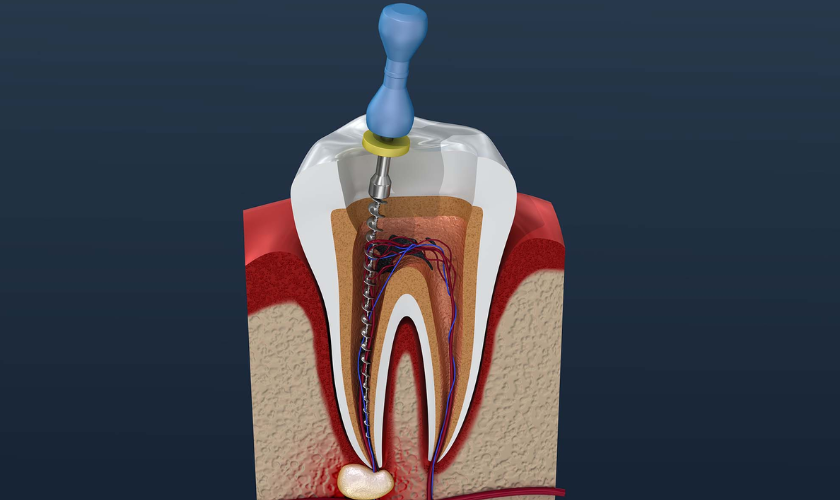
The mention of a root canal often conjures images of discomfort and dental anxiety for many. However, understanding the importance of early detection in root canal cases can transform this perception. In this blog post, we will delve into the intricacies of root canal treatment, emphasizing the significance of identifying issues early on. By shedding light on the process, benefits, and potential consequences of delayed intervention, we aim to underscore the pivotal role that early detection plays in preserving oral health.
The Basics of Root Canal Treatment:
A root canal is a dental procedure designed to address issues within the soft pulp of a tooth. The pulp, which is situated in the center of the tooth, is composed of nerves, blood vessels, and connective tissues. When this area becomes infected or inflamed due to decay, trauma, or other factors, a root canal becomes necessary to alleviate pain and save the tooth.
The procedure involves removing the infected pulp, cleaning and disinfecting the interior of the tooth, and sealing it to prevent further infection. While root canals have earned a reputation for being daunting, advancements in dental technology and techniques have made the procedure more comfortable and efficient.
Now, let’s have a look at how early detection helps in root canal treatment.
The Importance of Early Detection:
Pain Management: Early detection allows for prompt intervention, reducing the likelihood of severe pain associated with advanced root canal issues. Identifying problems in their infancy enables dentists to address the root cause before it escalates.
Preserving Natural Teeth: Early detection and timely root canal treatment offer the best chance of preserving natural teeth. Saving the tooth through a root canal is often preferable to extraction, as it maintains oral function and aesthetics.
Preventing Spread of Infection: Root canal infections can spread to surrounding tissues and, in severe cases, lead to abscess formation. Early intervention prevents the infection from spreading, reducing the risk of complications and the need for more extensive treatments.
Minimizing Discomfort: Early-stage root canal issues may not always manifest as severe pain. By identifying problems during routine dental check-ups or at the first signs of discomfort, patients can avoid the agony associated with advanced infections.
Signs and Symptoms of Root Canal Issues:
Recognizing the signs and symptoms of potential root canal problems is crucial for early detection. While not an exhaustive list, the following indicators should prompt a visit to the dentist:
Persistent Toothache: Prolonged or spontaneous tooth pain, especially when chewing or applying pressure, may signal a root canal issue.
Sensitivity to Hot or Cold: Increased sensitivity to temperature changes, particularly if it lingers after the stimulus is removed, can indicate pulp inflammation.
Swollen Gums: Swelling, tenderness, or the development of a pimple on the gums could be a sign of an abscess, indicating the need for immediate attention.
Darkening or Discoloration: Changes in tooth color, particularly darkening, may suggest an issue with the tooth’s pulp.
Prolonged Pain After Dental Procedures: Pain that persists beyond the expected recovery period after dental work may indicate a problem requiring root canal treatment.
The Consequences of Delayed Intervention:
Increased Pain and Discomfort: Delaying root canal treatment often results in increased pain and discomfort as the infection progresses. Severe cases may lead to throbbing pain, difficulty sleeping, and a significant decrease in the quality of life.
Risk of Tooth Loss: Neglecting early signs may lead to irreversible damage, necessitating tooth extraction rather than root canal therapy. Losing a natural tooth can have cascading effects on oral health and overall well-being.
Spread of Infection: Untreated root canal infections can spread to adjacent teeth, gums, and even the jawbone. This can result in more complex and invasive treatments to address the widespread infection.
Financial Implications: Delaying treatment may lead to the need for more extensive and costly dental procedures. Early detection and intervention are not only beneficial for oral health but also for minimizing financial burdens associated with advanced dental issues.
Early detection is paramount in root canal cases. Timely intervention reduces pain, preserves natural teeth, and prevents infection spread. Regular dental check-ups and swift action at the first sign of trouble ensure successful outcomes, transforming the once-feared root canal into a routine and manageable procedure. Prioritizing oral health and acting promptly contribute to a healthier, more confident smile.




